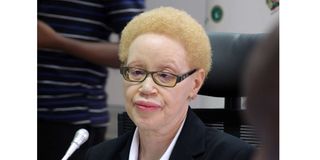Eyes on Justice Ngugi in Nairobi deputy governor's case

Lady Justice Ngugi Grace Mumbi.
What you need to know:
- The new governor shall nominate a person to fill the vacancy within 14 days after assuming office.
- Ms Mwenda, in her submissions, termed the accusations of possible witness tampering and evidence cluttering if she took office as “speculation”.
A decision by the High Court in the coming days will indicate whether Nairobians go to the polls if Governor Mike Sonko’s impeachment is upheld by the Senate.
Lady Justice Mumbi Ngugi has already heard all submissions in a suit filed by a Nairobi voter who seeks to know whether the beleaguered governor had the powers to nominate a deputy governor when he had been barred to access his offices owing to the criminal proceedings he is facing.
The judge did not indicate when the judgment will be read but told lawyers she will notify them when its ready.
If the judge rules that Sonko was within the law to nominate Anne Kananu Mwenda, she could proceed to be vetted by the County Assembly and sworn in as deputy governor and assume office.
If the judge rules that the governor was not within the law when he nominated Ms Mwenda, then the County Assembly Speaker Benson Mutura will assume office for 90 days pending a new election.
Supreme Court
Back in 2015, the Supreme Court, in an advisory opinion sought by the Speaker of Embu, had this to say on the issue of deputy governor: “We hold that, where a vacancy occurs in the Office of the Deputy County Governor, the governor shall within 14 days nominate a person to fill such vacancy.
The County Assembly shall vote on the nomination within 60 days after receiving it. Where a vacancy occurs in both the offices of county governor and deputy county governor at the same time, the Office of the Deputy County Governor shall remain vacant until the election of a new governor.
The new governor shall nominate a person to fill the vacancy within 14 days after assuming office.
“The County Assembly shall vote on the nomination within 60 days after receiving it. For the avoidance of doubt, we hereby state that this holding shall obtain in all circumstances pursuant to which the Office of the Deputy Governor may become vacant as contemplated by the Constitution, i.e death, resignation or impeachment.”
In February, Justice Ngugi issued orders directing the Nairobi Country Assembly not to vet Ms Mwenda who had been nominated as deputy governor by Sonko, until the case was filed by voter Peter Agoro was heard and determined.
Mr Agoro stated that the governor was acting in self-preservation in nominating Ms Mwenda. He argued the governor’s nominee would lead to interference with witnesses in the criminal suit.
“Sonko, after being charged, was ordered not to go to office or interfere with witnesses, which order was given to ensure that the integrity of the prosecution process is insulated from any interference,” said Agoro.
Ms Mwenda, in her submissions, termed the accusations of possible witness tampering and evidence cluttering if she took office as “speculation”.
“We submit that if there’s any apprehension of interference with State witness in the corruption case involving the governor , the Office of the Director of Public Prosecutions and other law enforcement agencies can arrange for the said witness to be placed under a witness protection progmamme as provided for in the witness protection Act chapter 79 Laws of Kenya. Similarly, mechanisms can be put in place by the law enforcement agencies to ensure no evidence is tampered or interfered with,” submitted Ms Kananu through Joseph Kiarie & Co. Advocates.
She further argued the Independent Electoral and Boundaries Commission had issued her with clearance certificate before she was nominated.
Mr Sonko proposed Ms Mwenda as the deputy governor, a position that has remained vacant since Polycarp Igathe resigned in January 2018, citing lack of trust from Mr Sonko. There were reports that the IEBC has never received a formal resignation from Mr Igathe.
Illegal
Director of Public Prosecutions Noordin Haji termed Ms Mwenda’s nomination illegal and violation of the bail terms.
Mr Sonko was charged together with senior officials in his administration in December and was released after posting cash bail of Sh15 million.
They denied charges of embezzling funds from the county government through dubious contracts. The money was allegedly wired back to Mr Sonko’s personal accounts and deposited in various parts of the country, on different dates.
The charges against them include money laundering, conflict of interest, abuse of office, acquisition of public funds and conspiracy to commit an economic crime, among others.





